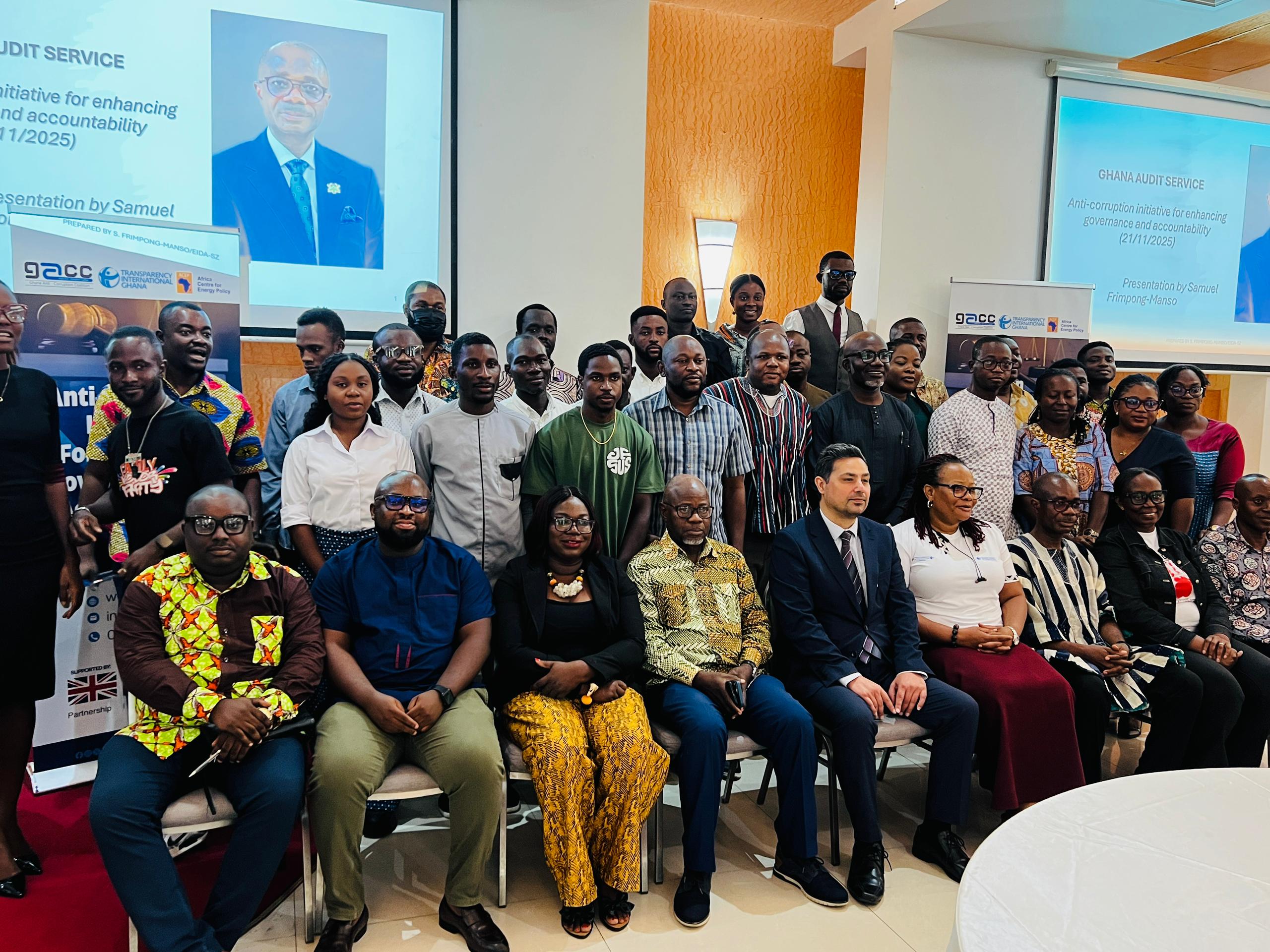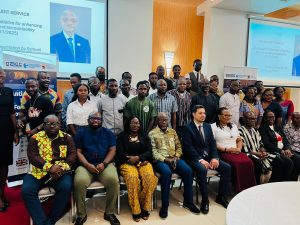
Accra, Ghana//-The Ghana Anti-Corruption Coalition (GACC), in collaboration with Africa Centre for Energy Policy (ACEP), and the Foreign, Commonwealth & Development Office (FCDO), has built the capacity of selected journalists across the Greater Accra Region.
The GACC and its partners organised a day’s media capacity-building workshop on the CitizensEye App and the Auditor-General’s Reports for the media practitioners.
The workshop, organised by the ACEP-led coalition as part of the project titled “An Anti-Corruption Initiative for Enhancing Governance and Accountability,” and funded by the FCDO, aimed to deepen journalists’ understanding of the constitutional mandate of the Auditor-General (Article 187).
It also strengthened journalists’ capacity to interpret and report on the Auditor-General’s Reports, and introduce them to the CitizensEye App as a tool for developing evidence-based stories on governance and anti-corruption issues, the Executive Secretary of the Ghana Anti-Corruption Coalition, Mrs Beauty Emefa Narteh, said in her remarks.
She added that the training was meant to equip journalists with practical tools to scrutinise audit reports and track actions taken by state agencies or institutions.
Mrs Narteh urged the participating journalists to endeavour to share the knowledge acquired from the work with their colleagues at their various newsrooms in to broaden the impact of the very useful training.
In his welcome address, Policy Lead for Petroleum and Conventional Energy at ACEP, Kodzo Yaotse said: “Today’s session will help you journalists to understand the work that the Ghana Audit Service is doing, the tools that they have to help citizens to support the recovery, and working on the infractions that have been identified in the audit reports”.
He continued: “For strengthening your own capacity and also to enable you to interface with powerful experts and also to help educate the citizens that you interact with because you are more of a catalyst for the demand side of accountability in the country”.
Mr Yaotse entreated the journalists to indulge the resource persons of the workshop and learn as much as they can from the interactions for their own work so that “we can be able to build a more solid process on ensuring accountability in the country”.
On her part, the Executive Director of Ghana Integrity Initiative (GII), Mrs Mary Addah, described the workshop as a “very novel” one, this is because the fight against corruption can only benefit and be more informed if we have the capacity.
“For us, we work with the media daily. So, the media being able to report the issues as they come out and very accurately is critical to this fight”, she said.
“So, learning about what the audits are, and how they are conducted, and also the reporting platforms available, particularly the CitizensEye app that the Audit Service has, is for me very informative. So, let’s take this workshop very seriously, because we believe that with you, we can do a lot more”, Mrs Addah urged.
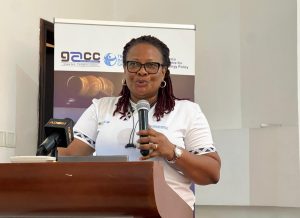
Deputy Auditor-General of the Ghana Audit Service, Lawrence Ayagiba, said the programme is being organised at a better time.
“This is a programme that we, as the Ghana Audit Service, should actually be carrying out, because it is for our work. The types of reports that we write are written for Ghanaians to know what is happening. But they are written in big English language. The people don’t understand”, he said.
Mr Ayagiba continued: “There are certain times that we’ve written a report concerning a district. Let’s say X and the people in that district will be watching on TV, and they won’t know that they are talking about them.
It is you, the journalists, who will have to make it clearer to them that this is what the auditors are talking about. So, they can support us”.
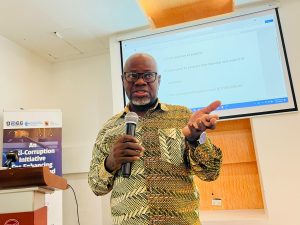
In other jurisdictions, when the Auditor-General produces a report, the meeting with journalists becomes an event. It is a yearly event, and it rotates annually for the Auditor-General to meet journalists.
When we submit our report to the Parliament of Ghana that particular day, we meet journalists and brief them on what we have submitted to Parliament and answer their questions, so that they can carry the information to the public, Mr Ayagiba noted.
He admitted that it is difficult for the Ghana Audit Service to do so because of the constraints. “So, if we have a programme like this to support us, we cannot say it is a bad thing. We are very happy to have you here”.
The Head of Political and Governance at the Foreign, Commonwealth & Development Office, Hooman Nouruzi, said: “It is such an important piece of work that you all are involved in across the Ghana Anti-Corruption Coalition, Transparency International Ghana, and ACEP, especially the journalists”.
He iterated the important role of the journalists to communicate the work of the Ghana Audit Service, which is fundamental to society, not just in Ghana, but everywhere, to communicate that to the people to be able to scrutinise it, to be able for citizens to understand how their money is being spent.
“We are all delighted to join this important workshop today focuses on building media capacity to understand audit reports and using it effectively for advocacy”, Mr Nouruzi said.
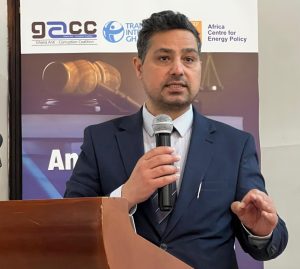
During presentation sessions, Assistant Director of Audit and Information Officer at the Ghana Audit Service, Frederick Lokko, underscored the importance of accurate and contextual reporting on the Auditor-General’s reports and findings.
“We want the media to fully understand the audit process and the terms used so that reportage reflects the true meaning of the reports,” according to him.
The Auditor-General’s role, as outlined in Article 187 of the Constitution and the Audit Service Act, is to identify financial irregularities and make recommendations, Mr Lokko told journalists.
Issues requiring legal action are referred to relevant agencies such as the Attorney-General’s Department and the Economic and Organised Crime Office (EOCO), and the Office of the Special Prosecutor (OSP).
He noted that funds recovered from these state agencies are normally paid into the Consolidated Fund for the government’s use.
Mr Lokko used the opportunity to clarify a long-held misconception that the Auditor-General doesn’t have the power to prosecute public officials who commit financial and other irregularities.
“We only have the power to surcharge. We can issue a surcharge certificate which can be acted upon or enforced by the Attorney-General Department”, he added.
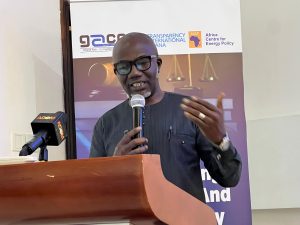
In a joint presentation on the audit process and Auditor-General’s reports by Samuel Frimpong-Manso and Thomas Nunoo, both assistant Auditor-Generals of the Ghana Audit Service, said auditing goes through a lot of quality controls.
“Every auditor has to do this, whether you are a public sector auditor or a private auditor. As an auditor, you must plan your work and then execute it. You go to the field, and then you conduct the audit. From there, you have to report”.
Mr Frimpong-Manso said he has never seen an auditor who doesn’t have an audit report saying that the audit report must have an opinion on the financial statements and then a management letter or letter of weakness.
He added that the auditors also do follow-up, but then, within this process, some of the issues that are supposed to be in the Auditor-General’s reports are escalated and are consolidated into the Auditor-General’s reports.
Later, the directors of the Ghana Audit Service handed over portions of the Auditor-General’s reports to the journalists for practical work.
While Director of Audits of the Ghana Audit Service, Madam Roberta Ntim and other directors took the journalists through the CitizensEye App and encouraged them to download the app for their own usage.


